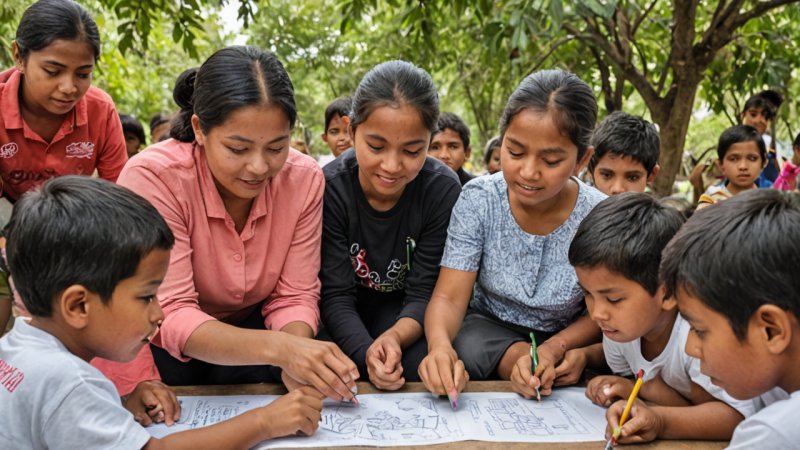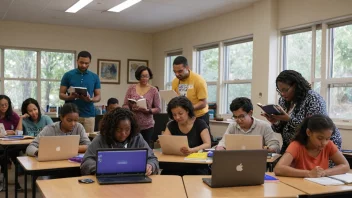Education is often heralded as the cornerstone of sustainable community development. It empowers individuals, fosters social cohesion, and drives economic growth, all of which are essential for building resilient communities. In a rapidly changing world, where challenges such as poverty, inequality, and environmental degradation are prevalent, the role of education becomes even more critical. This article delves into the multifaceted relationship between education and sustainable community development, exploring how educational initiatives can contribute to creating a better future for all.
The Foundations of Sustainable Community Development
Sustainable community development is a holistic approach that seeks to enhance the quality of life for all members of a community while ensuring the health of the environment and economic viability. It encompasses various dimensions, including social, economic, environmental, and cultural factors. Education plays a pivotal role in each of these dimensions, serving as a catalyst for change and progress.
Education as a Tool for Social Empowerment
One of the most significant impacts of education is its ability to empower individuals and communities. When people are educated, they are more likely to participate in civic activities, advocate for their rights, and contribute positively to their communities. Education fosters critical thinking, enabling individuals to challenge social injustices and advocate for equality.
Building Social Cohesion
Education has the power to bring people together, fostering a sense of belonging and community. Programs that promote inclusivity and diversity in educational settings can help bridge divides between different groups. This social cohesion is essential for sustainable development, as it encourages collaboration and mutual support among community members.
Promoting Gender Equality
Education is a vital tool for promoting gender equality. Educating girls and women leads to improved health outcomes, economic independence, and enhanced decision-making power within households and communities. When women are educated, they are more likely to invest in the education of their children, creating a positive cycle of empowerment and development.
Economic Growth and Development
Education directly contributes to economic growth by equipping individuals with the skills and knowledge necessary for employment. In a global economy that is increasingly reliant on innovation and technology, a well-educated workforce is crucial for competitiveness.
Vocational Training and Skill Development
Vocational training programs that focus on practical skills can significantly enhance employability among community members. These programs are particularly important in regions facing high unemployment rates. By aligning educational offerings with local job market demands, communities can foster economic resilience and reduce poverty.
Entrepreneurship and Innovation
Education also encourages entrepreneurship by providing individuals with the knowledge and skills needed to start and manage businesses. Educational initiatives that promote creativity, problem-solving, and critical thinking can lead to innovative solutions that address local challenges and stimulate economic growth.
Environmental Awareness and Sustainability
As communities face pressing environmental issues, education plays a vital role in raising awareness and promoting sustainable practices. Environmental education cultivates a sense of responsibility towards the planet and equips individuals with the knowledge to make informed decisions.
Integrating Sustainability into Educational Curricula
Incorporating sustainability into educational curricula ensures that future generations are equipped to tackle environmental challenges. Schools and educational institutions can teach students about conservation, renewable energy, and sustainable agriculture, empowering them to become stewards of the environment.
Community-Based Environmental Initiatives
Community-based educational programs that focus on environmental stewardship can foster local engagement and action. Initiatives such as tree planting, waste management, and community gardens not only educate participants but also contribute to the overall health and sustainability of the community.
Health and Wellbeing
Education is closely linked to health outcomes. Educated individuals are more likely to make informed health choices, access healthcare services, and advocate for better health policies within their communities.
Health Education and Awareness
Health education programs that inform communities about nutrition, hygiene, and disease prevention can lead to improved health outcomes. By equipping individuals with knowledge about their health, education can reduce the burden of preventable diseases and enhance overall wellbeing.
Mental Health and Community Resilience
Education can also play a role in promoting mental health awareness and support. Community programs that address mental health issues and provide coping strategies contribute to the resilience of community members, enabling them to navigate challenges more effectively.
Challenges in Educational Access
Despite the critical role of education in community development, access to quality education remains a significant challenge in many parts of the world. Barriers such as poverty, discrimination, and inadequate infrastructure hinder educational opportunities for marginalized groups.
Addressing Barriers to Education
Efforts to improve access to education must consider the unique challenges faced by different communities. Initiatives that provide scholarships, transportation, and support services can help remove barriers and ensure that all individuals have the opportunity to learn and grow.
The Importance of Community Involvement
Community involvement is essential for addressing educational challenges. Local stakeholders, including parents, educators, and community leaders, can work together to advocate for better educational policies and resources. Collaborative efforts can lead to innovative solutions that meet the specific needs of the community.
Conclusion
In conclusion, education is a fundamental pillar of sustainable community development. It empowers individuals, fosters social cohesion, drives economic growth, and promotes environmental stewardship. To harness the full potential of education, communities must address existing barriers and actively engage in collaborative efforts to improve access to quality education for all. By investing in education, we can create resilient communities that are equipped to face the challenges of the future. Every action counts, and by prioritizing education, we can pave the way for a brighter, more sustainable world.






